8 Highest-Quality Pickles on Grocery Shelves—and 3 To Avoid
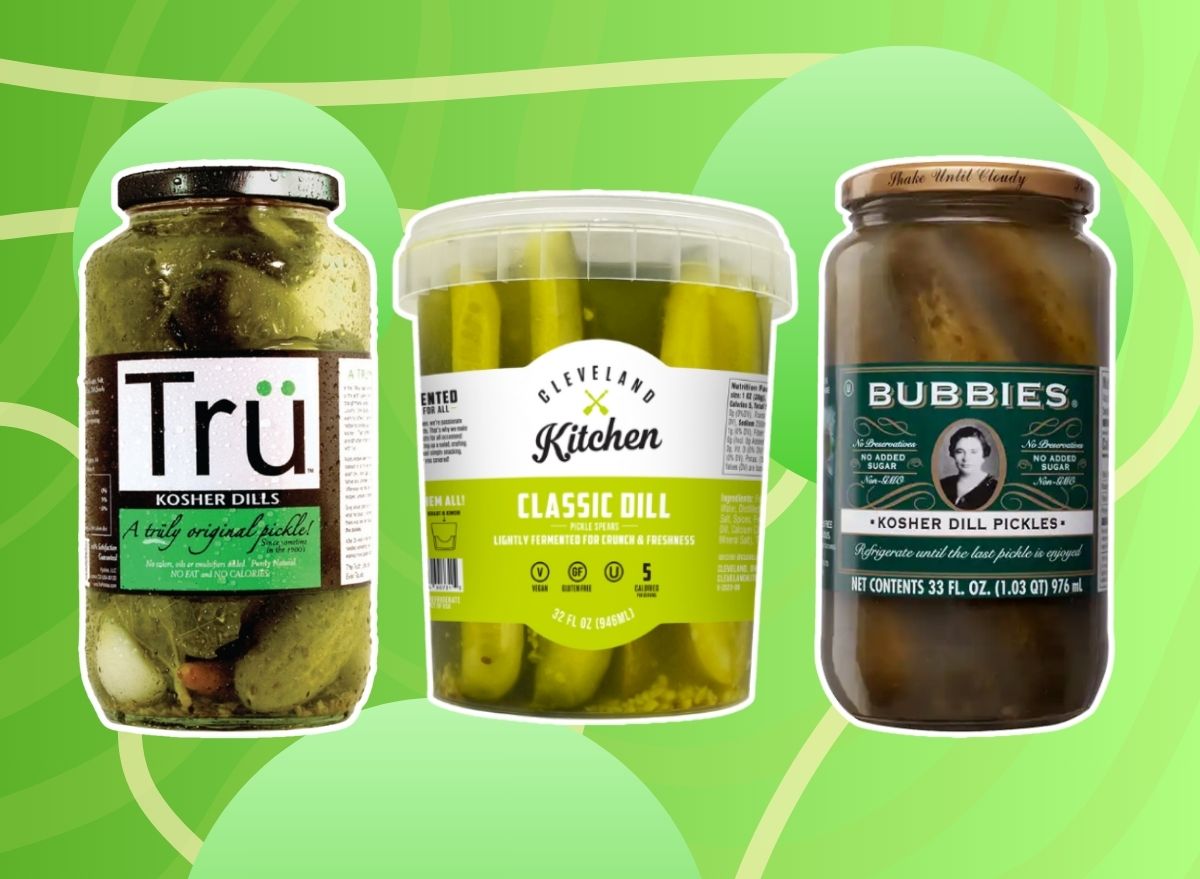
Whether you’re indulging in a salty snack, adding a slice to your sandwich, or topping off your burger, pickles are a savory solution whenever you’re craving a flavorful, crunchy bite. A good source of micronutrients and with a low calorie count, for the most part, pickles are a healthy food. However, not all store-bought options are created equal, and finding the highest-quality pickles is important when making your purchase.
Pickles are made through either fermentation or vinegar pickling. In fermentation, cucumbers are preserved in a saltwater brine, which encourages beneficial bacterial growth, while vinegar pickling submerges vegetables in a salty vinegar solution along with spices and flavorings.
Even though these processes can be done with simple pantry ingredients, many manufacturers add preservatives to prolong shelf life, some of which may pose health risks. One of the most common preservatives is sodium benzoate, an artificial ingredient that has been linked to possible increases in inflammation, effects on ADHD, and behavioral changes in children. While the FDA asserts that smaller doses of this preservative are generally safe, at the end of the day, if there are high-quality pickle brands that don’t use artificial preservatives, why not opt for those?
Additionally, it’s important to pay attention to pickles’ sodium content given salt’s integral role in pickling. Naturally, pickles tend to be higher in sodium, but most healthy brands keep their levels between 150-300 milligrams per serving.
To help you pick the best pickles on grocery story shelves, we’ve curated a list of some of the healthiest, highest-quality pickle brands on the market today, as well as a few not-so-great choices that we suggest leaving behind if you can. Read on to learn more, then check out 20 Healthy Chips for Weight Loss.
The 8 Highest-Quality Pickle Brands
Cleveland Kitchen Dill Pickles
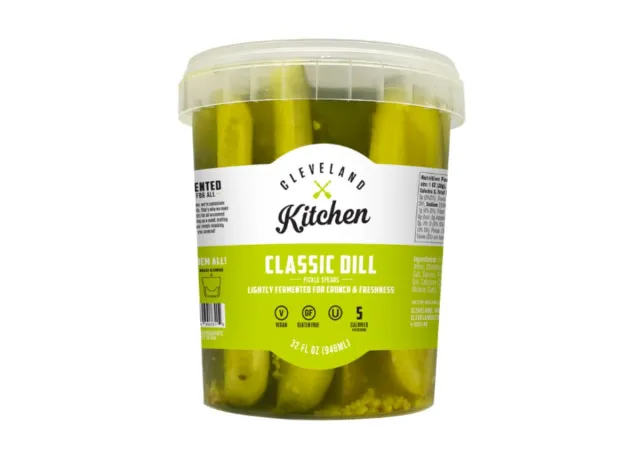
Calories: 5
Fat: 0 g (Saturated Fat: 0 g)
Sodium: 210 mg
Carbs: 1 g (Fiber: 0 g, Sugar: 0 g)
Protein: 0 g
“Cleveland Kitchen stands out as a premier choice for pickle enthusiasts due to its dedication to using locally sourced, high-quality ingredients and its unique fermentation process,” says Lauren Manaker, MS, RDN. “This meticulous approach ensures that every jar of pickles not only bursts with bold, authentic flavors but also contains beneficial probiotics that support gut health.”
Going beyond just their impact on health, Manaker says “Their commitment to sustainability and community involvement further solidifies Cleveland Kitchen as a brand that not only delivers exceptional products but also cares deeply about its impact on the environment and local economies.”
Grillo’s Pickles
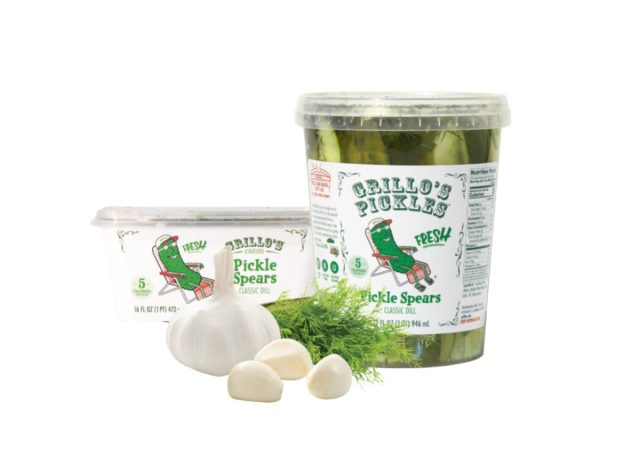
Calories: 5
Fat: 0 g (Saturated Fat: 0 g)
Sodium: 200 mg
Carbs: 1 g (Fiber: 0 g, Sugar: 0 g)
Protein: 0 g
Calling themselves “The OG” of dill pickle spears, Grillo’s Pickles has been making high-quality products for over 100 years. You’ll find nothing but cucumbers, brine, garlic, dill, and grape leaves in this container, and each serving sticks to 200 milligrams of sodium. These pickles are also certified Kosher, vegan, and gluten-free.
Vlasic Bread & Butter Chips
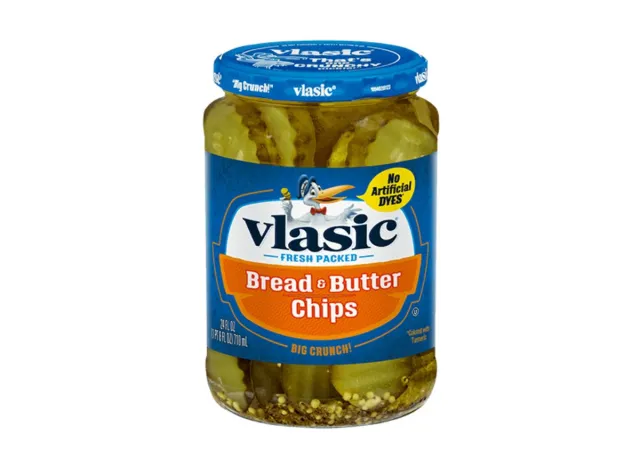
Calories: 10
Fat: 0 g (Saturated Fat: 0 g)
Sodium: 170 mg
Carbs: 2 g (Fiber: 0 g, Sugar: 2 g)
Protein: 0 g
Some of the healthy pickle options on our list may be harder to find in certain stores, so for a trustworthy option that you can almost always guarantee you’ll find on the shelf, Manaker suggests Vlasic Bread & Butter Chips.
“Their secret recipe makes Vlasic Bread & Butter Chips deliciously tart with a hint of sweetness, and freshly packed for a great crunch, they are a quality choice with no artificial dyes—they are naturally colored with turmeric instead!” says Manaker.
Not only is their ingredients list free of artificial dyes, but a serving of these pickles also stays below 200 milligrams of sodium.
Foraged & Found Dill Pickle Slices with Superfood Kelp
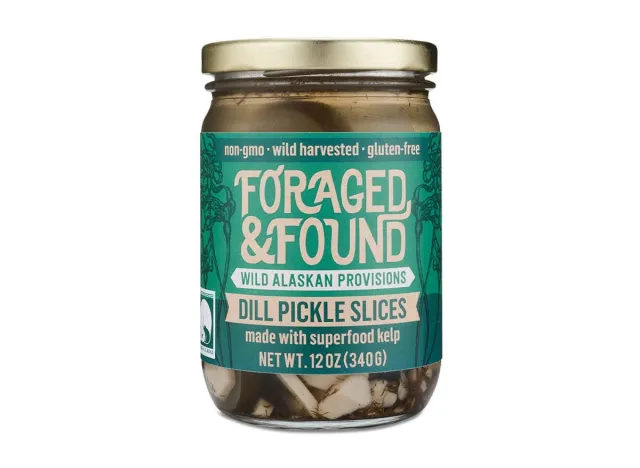
Calories: 10
Fat: 0 g (Saturated Fat: 0 g)
Sodium: 170 mg
Carbs: 2 g (Fiber: 0 g, Sugar: 0 g)
Protein: 0 g
Made with clean and simple ingredients like Alaskan kelp, vinegar, garlic, dill seed, and garlic, the Superfood Kelp Dill Pickles from Foraged & Found are a no-brainer.
“These pickles aren’t made with the classic cucumber ingredient and instead are made with kelp, giving this option an edge in the nutrition department, specifically when it comes to iodine,” says Manaker. Getting enough iodine is important for things like metabolism and thyroid function, so that’s a huge win for those who need a boost of this mineral.
When it comes to sourcing these pickles, Foraged & Found is top-tier, providing kelp that is hand-harvested from Alaska, says Manaker.
Bubbies
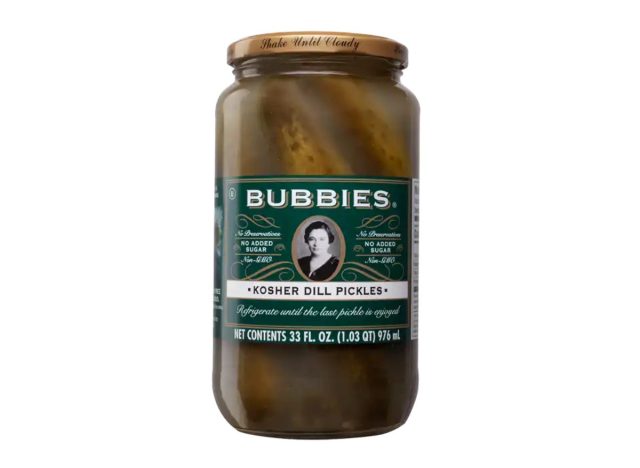
Calories: 0
Fat: 0 g (Saturated Fat: 0 g)
Sodium: 270 mg
Carbs: 0 g (Fiber: 0 g, Sugar: 0 g)
Protein: 0 g
We love a super simple ingredients list when looking for the right pickles, and it doesn’t get much better than Bubbies. Made without any preservatives or added sugars, you’ll know exactly what you’re putting in your body when you chow down on this snack.
Another plus of this product is that it is fermented with naturally occurring cultures, and eating fermented foods has been proven to help improve the health of your gut.
Suckerpunch Fiery Hot Three Pepper Pickle Pack
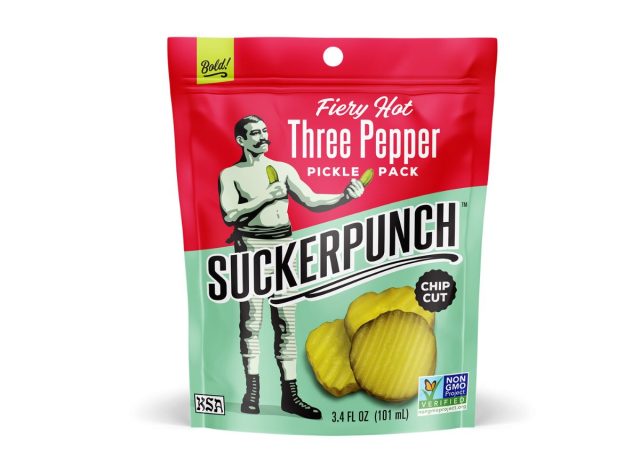
Calories: 20
Fat: 0 g (Saturated Fat: 0 g)
Sodium: 200 mg
Carbs: 4 g (Fiber: 0 g, Sugar: 3 g)
Protein: 0 g
You have moderate pickle lovers who just enjoy a spear or two with their sandwich at lunch, and then you have pickle enthusiasts who would snack on this food all day if they could. For the more fervent pickle fans, these snackable bags from Suckerpunch are the perfect purchase.
With only 200 milligrams of sodium per package and made without any artificial flavors or colors, this is a high-quality product worth trying.
Trü Kosher Dill Pickles
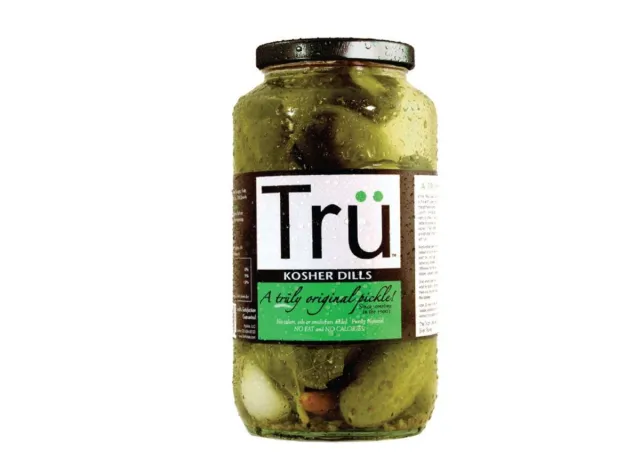
Calories: 0
Fat: 0 g (Saturated Fat: 0 g)
Sodium: 310 mg
Carbs: 1 g (Fiber: 0 g, Sugar: 0 g)
Protein: 0 g
Every single ingredient in Trü Kosher Dill Pickles is natural, with items like cucumbers, vinegar, salt, garlic, and peppers. Trü sells a few different pickle products, with items you’d expect like Dill Spears or Bread & Butter Slices, but you can also find more unique spins on classic flavors, with options like their Spiced Chai or Heat Spicy.
Good & Gather Organic Hamburger Dill Chips
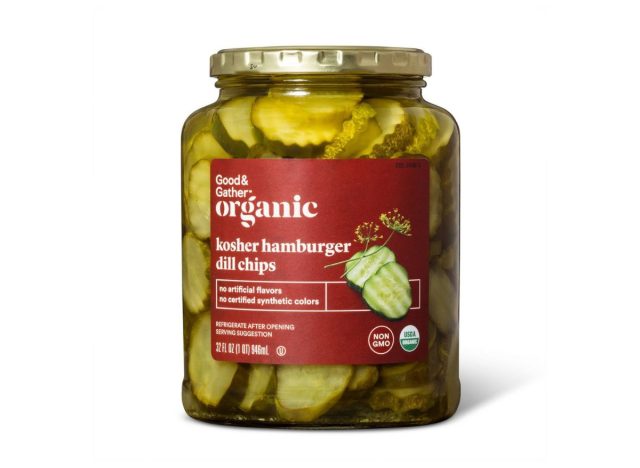
Calories: 0
Fat: 0 g (Saturated Fat: 0 g)
Sodium: 260 mg
Carbs: <1 g (Fiber: 0 g, Sugar: 0 g)
Protein: 0 g
These Hamburger Dill Chips from Good & Gather are free of ingredients like sodium benzoate and use turmeric for natural coloring, and they’re completely void of any added sugars. We also appreciate that the sodium count is on the relatively lower end with 260 milligrams.
3 Pickle Brands to Avoid
Mt. Olives Bread & Butter Sandwich Stuffers
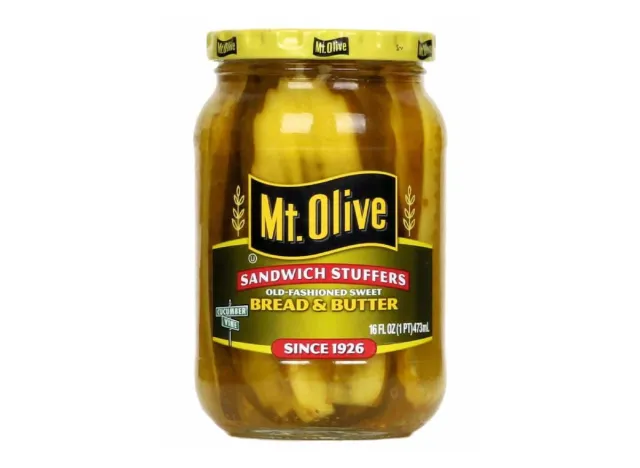
Calories: 20
Fat: 0 g (Saturated Fat: 0 g)
Sodium: 130 mg
Carbs: 0 g (Fiber: 0 g, Sugar: 4 g)
Protein: 0 g
The sodium count in these Mt. Olives Bread & Butter Sandwich Stuffers is certainly on the lower end, but these pickles contain artificial preservatives like sodium benzoate and Yellow 5, which is an artificial coloring that has been linked to possible effects on behavior and depression in children. Animal studies have also shown that Yellow 5 can have possible toxic effects.
Oh Snap! Dilly Bites
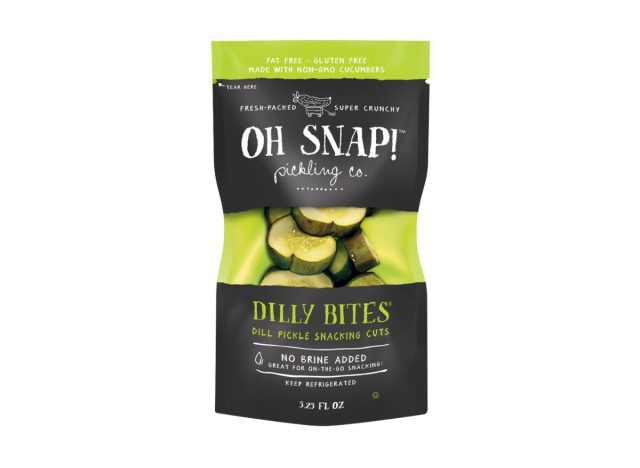
Calories: 15
Fat: 0 g (Saturated Fat: 0 g)
Sodium: 660 mg
Carbs: 2 g (Fiber: 0 g, Sugar: 0 g)
Protein: 0 g
Being able to take these Oh Snap! Dilly Bites with you on the go has its appeal, but there are a few reasons we’d suggest leaving them on the shelf. For one, you’ll find that pesky preservative, sodium benzoate, on their ingredients list. But more shocking is their 660 milligrams of sodium per serving—a number that is far higher than most other pickle products out there.
Claussen Dill Pickle Spears
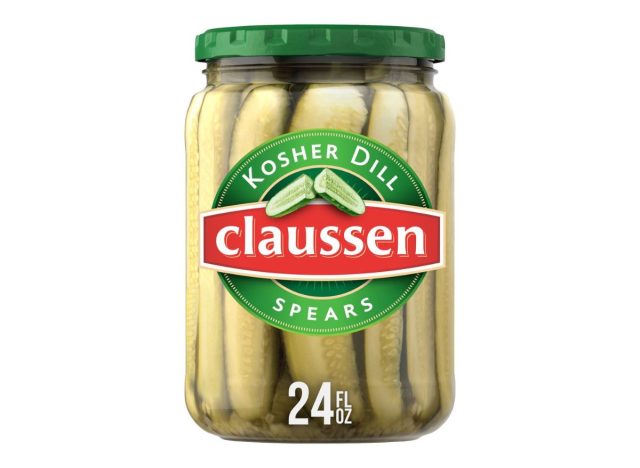
Calories: 5
Fat: 0 g (Saturated Fat: 0 g)
Sodium: 280 mg
Carbs: 1 g (Fiber: 0 g, Sugar: 0 g)
Protein: 0 g
Claussen Dill Pickles do contain natural flavors, but with sodium benzoate on the ingredients list, you’re better off choosing any of the healthier pickle brands on our list.
The sodium count for these spears isn’t terrible, but if you want something even lower, choose one of the pickle brands from our list that have 200 milligrams or less.
- Source: Raposa B, Pónusz R, Gerencsér G, Budán F, Gyöngyi Z, Tibold A, Hegyi D, Kiss I, Koller Á, Varjas T. Food additives: Sodium benzoate, potassium sorbate, azorubine, and tartrazine modify the expression of NFκB, GADD45α, and MAPK8 genes. Physiol Int. 2016 Sep;103(3):334-343. doi: 10.1556/2060.103.2016.3.6. PMID: 28229641.
- Source: Beezhold BL, Johnston CS, Nochta KA. Sodium benzoate-rich beverage consumption is associated with increased reporting of ADHD symptoms in college students: a pilot investigation. J Atten Disord. 2014 Apr;18(3):236-41. doi: 10.1177/1087054712443156. Epub 2012 Apr 25. PMID: 22538314.
- Source: Stevenson J, Sonuga-Barke E, McCann D, Grimshaw K, Parker KM, Rose-Zerilli MJ, Holloway JW, Warner JO. The role of histamine degradation gene polymorphisms in moderating the effects of food additives on children's ADHD symptoms. Am J Psychiatry. 2010 Sep;167(9):1108-15. doi: 10.1176/appi.ajp.2010.09101529. Epub 2010 Jun 15. PMID: 20551163.
- Source: CFR - Code of Federal Regulations Title 21. (n.d.). https://www.accessdata.fda.gov/scripts/cdrh/cfdocs/cfcfr/cfrsearch.cfm?fr=184.1733
- Source: Office of Dietary Supplements - iodine. (n.d.). https://ods.od.nih.gov/factsheets/Iodine-Consumer/#:~:text=Iodine%20is%20a%20mineral%20found,development%20during%20pregnancy%20and%20infancy.
- Source: Leeuwendaal NK, Stanton C, O'Toole PW, Beresford TP. Fermented Foods, Health and the Gut Microbiome. Nutrients. 2022 Apr 6;14(7):1527. doi: 10.3390/nu14071527. PMID: 35406140; PMCID: PMC9003261.
- Source: McCann, D. C., Barrett, A., Cooper, A., Crumpler, D., Dalen, L., Grimshaw, K., Kitchin, E., Lok, K. Y. W., Porteous, L., Prince, E. B., Sonuga‐Barke, E., Warner, J. O., & Stevenson, J. (2007). Food additives and hyperactive behaviour in 3-year-old and 8/9-year-old children in the community: a randomised, double-blinded, placebo-controlled trial. The Lancet, 370(9598), 1560–1567. https://doi.org/10.1016/s0140-6736(07)61306-3
- Source: Merinas-Amo, R., Martínez-Jurado, M., Jurado-Güeto, S., Alonso-Moraga, Á., & Merinas-Amo, T. (2019). Biological effects of food coloring in in vivo and in vitro model systems. Foods, 8(5), 176. https://doi.org/10.3390/foods8050176









